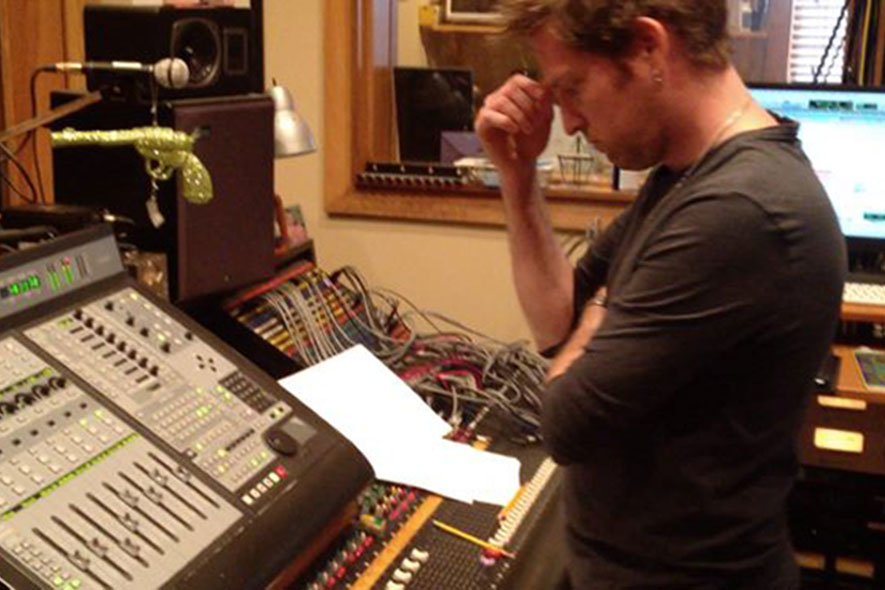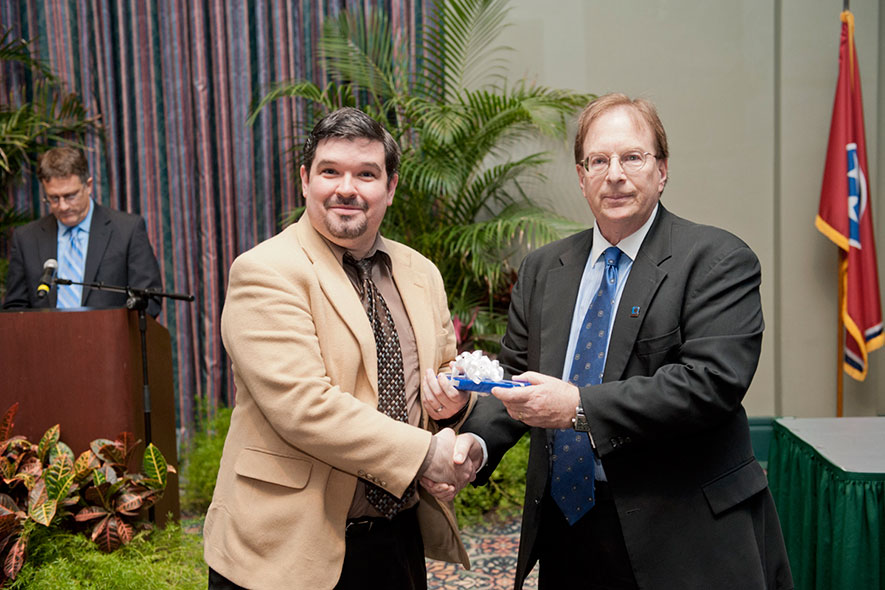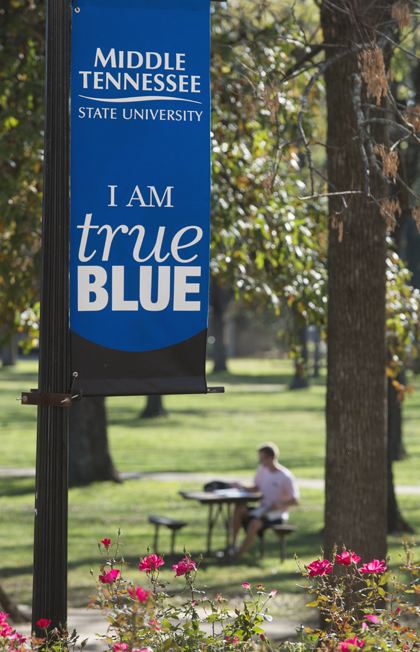
Music
Explore the content and construction of music, learn the language of music, and what makes it pleasing to the ear.
Music, Theory-Composition Concentration, B.M.
The Theory-Composition Concentration in the Bachelor of Music degree is offered by the College of Liberal Arts at MTSU.
As a Theory-Composition student in the School of Music, you'll gain a thorough grounding in music theory and history, combined with instruction in conducting and solo, chamber, and ensemble performance. The Theory-Composition program provides students opportunities to examine the content and construction of music, learn the language of music and what makes it pleasing to the ear, and discover what is involved in creating musical works. With award-winning and talented faculty members, the School of Music offers solid training and guidance that can lead to careers as composers, songwriters, music editors, and arrangers. To be admitted into the Bachelor of Music degree program, all entering students must pass an audition before the faculty on their major instrument or voice. In addition, all prospective new or transfer undergraduate music majors and minors are required to take the Music Theory and Aural Skills Diagnostic Exam to determine appropriate placement in the music theory program. For additional information and to schedule a time for the exam, contact the School of Music Office.
News Briefs

MTSU composer's works featured on films, TV
Battery Lane Music owner / producer / writer / engineer Scott Gerow, an MTSU graduate who studied composition, has become a successful composer in film, TV, and ad jingles. Gerow has placed songs in and produced music for such television series as Army Wives, How I Met Your Mother, and Sons of Anarchy, plus movies such as People Like Us, The Slammin' Salmon, and Crazy, Stupid, Love. He also has worked for many artists, including Christina Aguilera and Crystal Gayle. Gerow owns and manages Battery Lane Music, which specializes in artist production and publishing, studio recording, mixing, and music for film and TV. He has studied at and holds degrees from MTSU as well as the University of Miami and the Vienna School of Music in Austria.

Grammy-winning producer nominated for professor's CD
Osterfield: Rocky Streams, featuring faculty member and composer Paul Osterfield, was included in a catalog that earned a 2012 Grammy nomination for classical Producer of the Year for Blanton Alspaugh (the 2013 winner). The CD by Osterfield and fellow faculty Todd Waldecker had performances from 14 current and former MTSU School of Music professors including Don Aliquo, Michael Arndt, Sandra Arndt, Deanna R. Little, David Loucky, Tim Pearson, Dewayne Pigg, Stephen Smith, and William Yelverton. "This international recognition of the artistry of our MTSU professors as composer and performers is another milestone in the development of the School of Music as a national player," said Dr. George Riordan, former school director.
News Briefs
MTSU composer's works featured on films, TV

Battery Lane Music owner / producer / writer / engineer Scott Gerow, an MTSU graduate who studied composition, has become a successful composer in film, TV, and ad jingles. Gerow has placed songs in and produced music for such television series as Army Wives, How I Met Your Mother, and Sons of Anarchy, plus movies such as People Like Us, The Slammin' Salmon, and Crazy, Stupid, Love. He also has worked for many artists, including Christina Aguilera and Crystal Gayle. Gerow owns and manages Battery Lane Music, which specializes in artist production and publishing, studio recording, mixing, and music for film and TV. He has studied at and holds degrees from MTSU as well as the University of Miami and the Vienna School of Music in Austria.
Grammy-winning producer nominated for professor's CD

Osterfield: Rocky Streams, featuring faculty member and composer Paul Osterfield, was included in a catalog that earned a 2012 Grammy nomination for classical Producer of the Year for Blanton Alspaugh (the 2013 winner). The CD by Osterfield and fellow faculty Todd Waldecker had performances from 14 current and former MTSU School of Music professors including Don Aliquo, Michael Arndt, Sandra Arndt, Deanna R. Little, David Loucky, Tim Pearson, Dewayne Pigg, Stephen Smith, and William Yelverton. "This international recognition of the artistry of our MTSU professors as composer and performers is another milestone in the development of the School of Music as a national player," said Dr. George Riordan, former school director.
Related Media

Music majors in the Theory-Composition concentration at MTSU set themselves up for
professional music careers or to study for advanced degrees at premier schools ofmusic. Some alumni have continued studies for vocations outside of music. Possiblejob paths to consider with the degree include
- Band director/leader
- Composer/arranger/orchestrator
- Conductor
- Copyright specialist
- Film music director/editor
- Instrumental/vocal performer
- Music critic/journalist
- Music editor and publisher
- Music educator
- Music librarian
- Music software programmer
- Music theater director
- Musicologist
- Orchestra librarian
- Recording technician/engineer/mixer
- Songwriter
- Studio musician
- Studio/private teacher
- University professor
Employers hiring and graduate programs accepting MTSU alumni
- Recent alumni have gone on to graduate degrees in composition from the Boston Conservatory,the University of Cincinnati Conservatory of Music, the University of North Carolinaat Greensboro, the University of South Florida, and the University of Texas. Othershave attained graduate degrees in musicology at the University of North Carolina atChapel Hill and performance at the University of Louisville.
- Graduates have taught music in private studios and freelanced as composers, arrangers,and performers.
- Student and alumni composers have had their works performed at the Czech-AmericanSummer Music Institute in Prague, at Society of Composers conferences, on WLPN's Live in Studio C, and at New York's Fringe Festival.
- Alumni have been working in the publishing and recording industry, including as classicalmusic editor for Hal Leonard Publishers and digital services manager for Naxos ofAmerica.
- Several graduates have composed for independent local films.



MTSU's School of Music provides music majors with a thorough grounding in music theory and history, combined with instruction in conducting and solo, chamber, and ensemble performance. The concentration in Theory-Composition offers much more intensive training — examining the content and construction of music, learning the language of music and what makes it pleasing to the ear, and discovering what is involved in creating musical works. With award-winning and talented faculty members, MTSU's School of Music offers aspiring students solid training and guidance that can lead to careers as composers, songwriters, music editors, or arrangers.

CONTACT US

Please fill in the form below and we will contact you very soon











